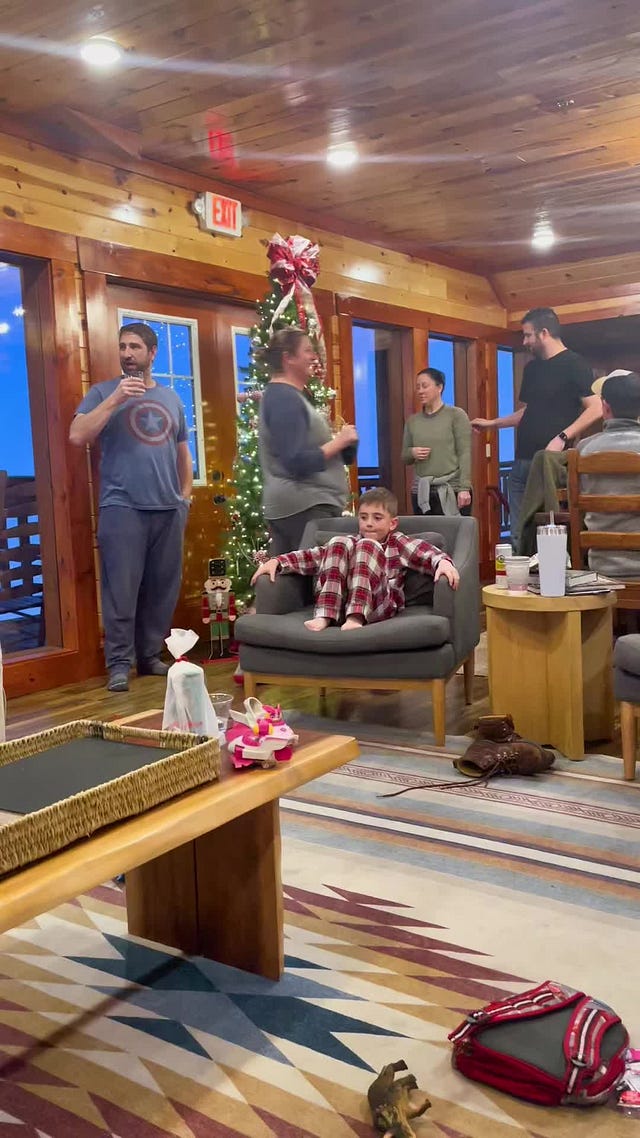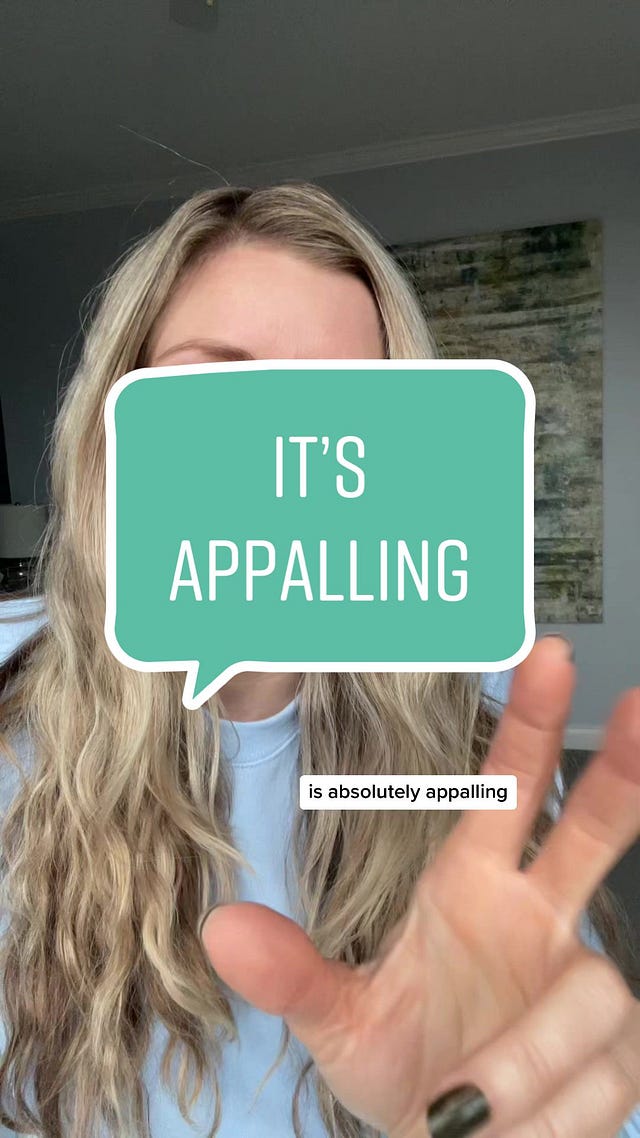Not everything is abuse
Defining run-of-the-mill jerk-ishness as abuse risks driving wedges between people
Thanks for checking out Nuclear Meltdown. If you haven’t already, smash that subscribe button.
Last fall, a weird story landed on my radar: A mom tweeted out that after her kids go to bed on Halloween she throws all of their candy in the garbage. When I first saw this, it struck me as weird and mean and not something I’d do. But hey, to each their own. The mom also indicated a belief that her kids’ lives would ultimately vindicate her Halloween tradition and while I’m skeptical, she could be right.
But the tweets blew up and generated thousands of responses, some of them accusing the mom of “abuse.” Which struck me as ridiculous. I don’t agree with this mom’s parenting choices and she sounds like a killjoy. Halloween candy is awesome. But eating candy isn’t a human right and parents have the right to parent as they see fit, even if their choices strike others as odd.
In any case, the real reason this stuck in my mind is that it happened around the same time I became aware of a 2016 article about “concept creep” and abuse. Authored by Nick Haslam, a psychology professor at the University of Melbourne, the paper argues that over time concepts that refer to negative experiences expand their meaning and encompass more things. In other words, the idea of what constitutes “abuse” or “bullying” becomes broader and broader1.
Haslam explores a number of case studies on topics such as abuse, bullying, trauma, prejudice and more, explaining how the definitions of these terms is significantly more expansive today than it was in the past. For instance, abuse used to refer to acts of physical harm or inappropriate sexual contact. Over time, however, the term has come to include a variety of other things such as psychological abuse and acts of omission, rather than just acts of commission2.
In some cases this expansion is definitely a good thing. Haslam specifically mentions in his discussion of prejudice, for example, that he’s not suggesting we should go back to some archaic definition of these terms. Concept creep can help replace blame with sympathy for abuse victims, and can make people more sensitive to suffering. There are benefits to concept creep.
But Haslam also argues that concept creep may limit people’s ability to overcome their problems:
A possible adverse looping effect of concept creep is therefore a tendency for more and more people to see themselves as victims who are defined by their suffering, vulnerability, and innocence, and who have diminished agency to overcome their plight. The flip-side of this expanding sense of victimhood would be a typecast assortment of moral villains: abusers, bullies, bigots, and traumatizers3.
Another downside is that concepts become diluted. Trauma, for instance, ceases to refer to “terrifying events that are outside normal human experience” and comes to refer to more “benign” experiences4, Haslam writes. And that can in turn inadvertently trivialize the experiences of people who suffered more severely5.
The Halloween candy debacle is a good example of this; by calling a relatively pedestrian, if unusual, parenting decision abuse, it dilutes the ability of that word to describe more conventional and serious forms of abuse.
Haslam’s paper is mostly focused on the field of psychology, but he also points out that concept creep trickles “down to the lay public, shaping the experience and self-understanding of many more people than the psychology profession can influence directly”6. And he ultimately concludes that by expanding definitions to include ever more things, concept creep runs the “risk of pathologizing everyday experience and encouraging a sense of virtuous but impotent victimhood"7.
Examples of this are everywhere.
For instance, not long after Halloween I began seeing videos on TikTok that showed adults dressed up as the Grinch rushing into homes and grabbing presents as kids look on in horror. I had never heard of this activity before 2022, but I saw dozens of videos of it on TikTok this Christmas. And in the vast majority of the videos, the kids were quite distraught. They cried, screamed, ran away in fear, etc. In a few cases, they laughed or fought back. But a lot of the time, it seemed pretty scary.
Here’s one of the more innocuous examples:
And here’s one where a little girl completely breaks down when she sees the Grinch, though to be fair in this case the Grinch appears to remain outside.
To be clear, I think this is terrible tradition. I love joking around with my kids, but I have never understood parents who “prank” their kids in ways that genuinely cause them fear or distress. These Grinch videos made me sad and disappointed that there are apparently a lot of parents who are jerks.
But is this kind of thing abuse? A lot of the commenters on these videos, and on social media generally, seemed to think so. Here’s an example:
Again and to be clear, I hated these Grinch videos. But applying the term “abuse” to well-intentioned but miserably failed pranks seems like a pretty obvious example of concept creep.
This ultimately raises a pair of concerns for me in a family context. First, expanding the term “abuse” too broadly limits parents’ ability to parent. To call something abuse is to imply that it shouldn’t be allowed. Obviously some limits on parental behavior are good. I shouldn’t be allowed to beat up or neglect my child, for example. But should parents be allowed to throw away their kids’ Halloween candy? Should they be allowed to prank their kids?8
The point is that the debate over Christmas pranks and Halloween candy, and what exactly constitute “abuse,” is also a debate about parental rights. It’s a debate about how much autonomy people should have to make choices about their families. There’s a line somewhere that parents aren’t allowed to cross, and there always has been. But concept creep pushes that line in one direction, and not necessarily in a way that seems useful.
My other concern is related to Haslam’s idea of “impotent victimhood” and the reverberating impacts that can have on relationships. So, if my parents subjected me as a child to a well-intentioned prank that went very awry, I can probably forgive that. But if they abused me that’s probably going to leave a lasting wedge between us. Indeed, real abuse probably ought to leave a wedge; I know people who have suffered serious physical and sexual harm at the hands of family members, and ultimately cut those family members out of their lives. They’re better off for having severed those relationships.
I’m not here to lay out definitions of what abuse is or isn’t. I’m not a psychologist, and though I have experienced negative things in my life, I haven’t suffered what I would classify as abuse. I am very fortunate, and my heart goes out to people who have suffered abuse. Echoing Haslam, one of the things that most concerns me about concept creep is the risk of inadvertently minimizing the severity of very real traumas people have experienced.
But also, if every unfortunate behavior ends up getting classified as abuse, every relationship ends up broken. Do I want to risk estrangement — a growing and widespread problem — over candy? Or more generally, over well-intentioned but misguided attempts to do the right thing?
In the end, I hope my own kids take a narrower view of abuse. My wife and I are doing our best and I don’t think anything we’re doing would count as abuse. But who knows. Thanks to concept creep, maybe letting my kids drink soda or play outside by themselves or watch four movies in a row during our Christmas party will someday be defined as abuse. But I hope not. And I hope that our attempts to provide them with a rich childhood don’t end up driving a wedge between us.
Thanks for checking out Nuclear Meltdown. If you’ve enjoyed this blog, please consider sharing it with a friend.
The paper explores two types of concept creep, which Haslam calls “vertical expansion” and “horizontal expansion.” The first is what happens when a term gradually starts referring to less and less severe versions of the same thing. And the second refers to what happens when a term starts including entirely new categories.
Haslam offers some interesting explanations for why concept creep happens, and why it happens specifically with negative concepts. This isn’t specifically a psychology blog, so the explanations are a bit beyond the scope here, but I thought they were interesting. Haslam speculates that the creep could be a result of technology, or that it could be that disciplines such as psychology “strive to broaden the realm of phenomena subject to their control.” Page. 13.
Page 14.
Page 14.
This reminded me a lot of a piece Freddie de Boer wrote last year on the “gentrification of disability.”
Page 14.
Page 1.
Some family pranksters on social media have very obviously, and criminally, crossed the line into abuse and have rightly been prosecuted for it.








I appreciate how well you articulate these concepts—I saw this exact phenomenon popping up in post-Mormon circles. I had a well-intentioned exmo friend say that everyone who raises their children inside Mormonism is abusive. I had lots of issues with that—even though I had plenty of negative experiences inside the church, I would never classify my childhood as abusive. I also had lots of negative experiences in middle school and soccer practice and at birthday parties—but that doesn't make my participation in those things traumatic, and it doesn't make those situations abusive.
I also have extended family members who were physically abused as children, and claiming that I was also abused because of my Mormon upbringing felt particularly insensitive and disingenuous. Just because something is harmful doesn't mean it's abusive, and being willing to hold the boundaries of what is and isn't abuse is actually better for victims of abuse in the long run.
I also see this kind of concept creep when people talk about the Mormon church being a cult—there are definitely elements of groupthink and limiting information in the church, but most folks can leave the organization without worrying about their physical safety, for example. And most folks can still communicate with members who are still inside the church, though yeah, those relationships can experience serious strain afterwards.
I wonder if it can be helpful to see these things as being similar to abuse, or similar to cults, or similar to trauma without actually being the thing. I think it could help people expand their sense of compassion for others, but I think we need to avoid the very "pick me" move of claiming trauma and abuse when our experiences don't actually measure up to those labels.
When everything is abuse, nothing is.